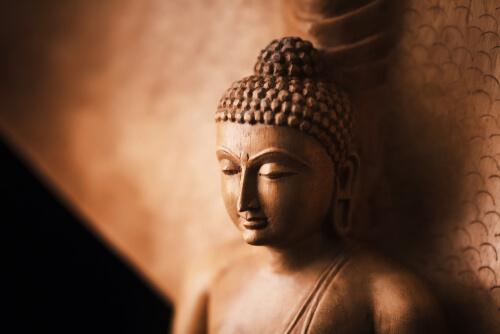We have a bad habit of wanting almost everything instantly, of doing things right away, we prefer to change the options to be patient, we are more willing to give up than to fight, especially if the fruits need time to mature.
Does it bother us to postpone the satisfaction of our desires, to have to wait? Our minds begin to bombard us, through concerns and expectations, to accelerate the pace of events.
- Thus we live fast and with a lot of noise.
- Both internal and external.
- Wandering from one place to another.
- Without a path beyond what marks our need for immediate satisfaction.
To this, we must add the hum of our inner voice, for thought seems to be present in everything we do. It’s like we’re hooked on him. We like to think, create hypotheses and get caught up in the vicious mazes and circles of our beliefs.
We don’t know, perhaps, the most important thing: how to get out of these self-imposed traps, how to free ourselves from our mental traps. The following Buddhist story gives us the answer.
“The mind is an excellent instrument, if used correctly. However, if not used properly, it becomes very destructive. Specifically, it’s not so much about using your mind the wrong way: you don’t usually use it, but she uses you. it’s the disease. You think you’re your mind. That’s the disappointment. Did the instrument take care of you?. Eckhart Tolle-
Buddha and his disciples decided to embark on a journey in which they would cross various territories and cities, one day, as the sun shone in all its splendor, they saw a lake in the distance and stopped to quench their thirst. Buddha addressed his youngest and most impatient disciple:
? I’m thirsty. Can you get me some water from this lake?
The disciple went to the lake, but upon arrival, he noticed that a wagon of oxen was beginning to pass through it and that the water gradually became cloudy, after this situation, the disciple thought, “I cannot give the master this murky water. to drink. ” Then he came back and said to Buddha:
? The water is very cloudy. I don’t think we can drink it.
After a while, about half an hour, Buddha again asked the disciple to go to the lake and bring him water to drink. The disciple did that. However, the water was still dirty, returned and in a blunt tone informed the Buddha of the situation:
-The water of this lake does not drink, it is better to walk to the city for its inhabitants to give us to drink.
Buddha did not answer, but did nothing, stood there. After a while, he asked the disciple to go back to the lake and bring him water. Because he did not want to challenge his master, he went to the lake; of course he was furious, because he didn’t understand why he had to come back if the water was cloudy and could not be taken.
When he arrived, he noticed that the water had changed his appearance, looked good and was clear, so he took a little and took it to Bouddha. I looked at the water and said to his disciple:
? What did you do to clean the water?
The disciple did not understand the question, had done nothing, it was obvious, then Buddha looked at him and explained:
? You waited and left him standing. This way, the mud settles on its own and you have clean water, your mind is like that too!When you’re upset, don’t move, give him some time. Don’t be impatient. On the contrary, be patient, you will find balance. You have no effort to calm her down, everything will happen if you don’t hold on to it.
Patience, that’s the secret of this Buddhist story. The art of knowing how to wait, respect the times and stop when the occasion warrants or needs it – above all, our thoughts. In fact, the more submerged we are and the larger the cobwebs formed by our beliefs, the more we must stop.
Doing nothing, giving time and waiting is a good option to calm the restless mind or monkey spirit, as The Buddhists call it, the one who leaps from one thought to another in a restless way, until they become exhausted and confused.
If we get carried away by impatience, anger, stress or frustration, as well as feeling bad, we will surely end up making hasty decisions, the result of our impulses. It is best to take a few minutes to breathe, move, emotionally move away from what happened and get in touch with yourself, because only in this way will we achieve this state of mental immobility, as indicated at the end of Buddhist history.
Sometimes it’s not so much about acting or doing something urgently, it’s about being calm and not being carried away by the sound of immediacy and pleasure; that is, calm the waters of our minds and wait as long as necessary, because when we calm our minds and achieve that peace of mind, emotions work with our thoughts and we are able to adopt other perspectives, other perspectives.
“It’s about sitting quietly, looking at the thoughts that go through you. Simply observing, without interfering, without judging, because the moment you judge you lose pure observation. By the time you say “it’s okay, it’s wrong, ” you’ve started the thought process. -Osho-

